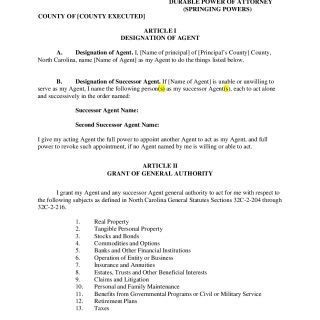Springing Power of Attorney
A springing Power of Attorney can be written so it goes into effect if you become incapacitated. Be very careful to define clearly exactly how others will determine that the "springing event" has occurred.
This type of power of attorney only becomes effective at a future time or with a future event, such as when the person travels outside the country or becomes incapacitated. It used to be common for durable powers of attorney to be written as "springing" into effect only if and when a doctor -- or more than one doctor -- certified that the principal had become mentally incapacitated. However, the process of getting a doctor to certify that someone is incapacitated has become difficult, even when the incapacity is obvious. Also, "mentally incapacitated" is medically and legally vague, so doctors are sometimes reluctant to make that determination. It can even be difficult to get hold of someone's medical records or to have a doctor discuss his condition.
While the Springing Power of Attorney is commonly signed during a period in which the adult patient is fully aware of the decision making process, the effective date of the Springing Power of Attorney is granted a future date when a physician, selected by the adult, makes determination that the adult is no longer mentally or physically capable of handling financial decisions.
Similar to the Springing Power of Attorney is another POA known as a Durable Power of Attorney which provides for the assignment of another individual to handle the adult's affairs even if the adult becomes mentally or physically incompetent. The difference between the Springing POA and the Durable POA lies in the effective date of the POA. Under the Durable Power of Attorney, the individual assigned with the rights is given those rights immediately and extending through any health status change by the adult. Conversely, the Springing Power of Attorney does not go into effect until such time as a physician has rendered the adult incapacitated.
Not all states in the US allow the use of Springing Power of Attorney, which is a type of Power of Attorney that only goes into effect under specific conditions, such as when the principal becomes incapacitated. The laws governing the use of Springing Power of Attorney can vary widely from state to state.
The following states do not allow the use of Springing Power of Attorney:
- Alabama
- Colorado
- Florida
- Iowa
- New Mexico
- North Carolina
- Ohio
- South Carolina
- Utah
It's important to note that the laws regarding Power of Attorney can change, so it's always a good idea to check with an attorney or legal professional to ensure that you have the most up-to-date information on the use of Springing Power of Attorney in your state.

